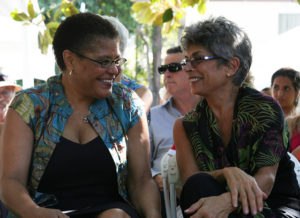
Continue reading That Time in 2005 When The City of Los Angeles Briefly Investigated BID Financial Shenanigans And Contract Violations Instead Of Pretending They’re Powerless In The Face Of Them Like They Do Now

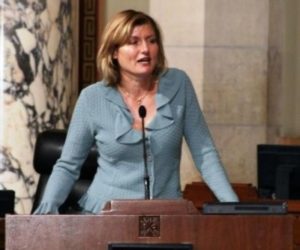
According to a Facebook post by Abbott Kinney,
BREAKING NEWS Re: the proposed Venice BID – Because the City shut off public comment, they gotta START THE WHOLE PROCESS OVER. Via City Clerk Holly Wolcott:
“The Ordinance of Establishment was adopted in Council last week. However, in light of concerns relative to the public hearing and to ensure all speakers are heard, we plan to repeal this ordinance and start the process over. This will mean a new Ordinance of Intention and a public hearing approximately 45 days from when the new ballots and packages are mailed. I do not have an actual date at this time.”1
This report is consistent with LAFLA’s objections to the process, and if true, is a major victory for anti-BID forces. Although I don’t know for sure I would bet it’s unprecedented in the history of BIDs in Los Angeles. The moral is decidedly NOT that the City made a sporadic mistake in this particular BID formation process. The moral is in fact that the City makes mistakes, breaks the law, cuts corners, all the freaking time, but generally no one is watching so their errors have no consequences. The moral is that if people watch closely they will find fatal errors in all of the City’s shenanigans.
The same is true for BIDs. They can barely open their mouths without saying something racist, they can barely run a meeting or email a Council member without breaking the law.2 They’re not used to scrutiny, and even their reactions to scrutiny just end up sinking them deeper into their morass. So the real moral is: SCRUTINIZE!
And, if you didn’t spot it, if this quote is accurate, then Holly Wolcott actually admitted that something illegal is going on over at City Hall. Turn the page for details.
Continue reading Unconfirmed But Highly Plausible Report that Venice Beach BID is Repealed and Process Must Start From Scratch!!
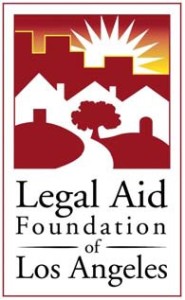 Today two interesting items hit the Venice Beach BID Council File. First there is a letter from LAFLA Attorney Shayla Myers demonstrating that the City did not follow the strictly mandated procedure for hearings prior to establishing an assessment district. The issue is that Council President Herb Wesson cut off public comment without allowing everyone present to be heard. This is completely acceptable under the Brown Act, which regulates general public meetings in California. In the cases covered by that law, agencies can put reasonable limits on public comment. However, the hearings that must be held before BIDs can be established are described in the Property and Business Improvement District Law of 1994, which at section 36623 requires that the “notice and protest and hearing procedure shall comply with Section 53753 of the Government Code.” This section requires…well, I’m going to let Myers explain:
Today two interesting items hit the Venice Beach BID Council File. First there is a letter from LAFLA Attorney Shayla Myers demonstrating that the City did not follow the strictly mandated procedure for hearings prior to establishing an assessment district. The issue is that Council President Herb Wesson cut off public comment without allowing everyone present to be heard. This is completely acceptable under the Brown Act, which regulates general public meetings in California. In the cases covered by that law, agencies can put reasonable limits on public comment. However, the hearings that must be held before BIDs can be established are described in the Property and Business Improvement District Law of 1994, which at section 36623 requires that the “notice and protest and hearing procedure shall comply with Section 53753 of the Government Code.” This section requires…well, I’m going to let Myers explain:
Continue reading LAFLA Questions Legality of Venice Beach BID Approval Process in Letter to Mike Feuer, Holly Wolcott. Ballot Tabulation Published By City, Demonstrating Anti-Democratic Nature of BID Process. CD11 and Shadowy BID Consultant Tara Devine Play Favorites With Information Access
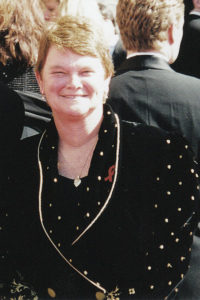
Readers of this blog are probably pretty familiar with the Brown Act’s requirements. They essentially say that the Supervisors can’t discuss legislative action in secret. They have to do it in public meetings.3 The law doesn’t restrict the kinds of things they can talk about, it doesn’t restrict the kinds of deals they can make with one another or with third parties. It only requires them to conduct their deliberations and decision-making in public.
So Kerry Morrison’s version of Sheila Kuehl’s position is disconcerting. She claims that Kuehl claims that the Brown Act prevents the Supervisors from eliminating homelessness because “…they can’t converse with each other. You can’t horse-trade votes. … You know, so you can’t collaborate, you know, can we all agree on what we’re all gonna…you have to do it all in open session, and it’s very cumbersome…” The idea seems to be that the supervisors can’t have an honest discussion in public, so they can’t have any discussion at all.
Kerry Morrison doesn’t elaborate, probably because the authoritarian world-view inherent in this statement is so comforting, so familiar to her. If you’re one of those who think that it’s more important that government of the people, by the people, for the people, shall not perish from the earth than it is to have the goddamned Red Line running on time you may have trouble following the argument, though.
Continue reading Kerry Morrison Says That Sheila Kuehl Blames Supervisors’ Complete Failure to Deal With L.A. County Homelessness On The Brown Act’s Open Meeting Requirements: We Can’t Solve Problems When People Are Watching

Business improvement districts in California are made possible by the Property & Business Improvement District Law of 1994.4 It’s worth reading, or at least skimming through, because there’s gold in them thar hills! For instance, consider Section 36670(a)(1), which states:
36670.(a) Any district established or extended pursuant to the provisions of this part … may be disestablished by resolution by the city council in either of the following circumstances:
(1) If the city council finds there has been misappropriation of funds, malfeasance, or a violation of law in connection with the management of the district, it shall notice a hearing on disestablishment.
Do you see the potential in that statement? The fact that it’s a tool for laying waste the BIDs of Los Angeles like so many Philistines? It’s a little hard to understand statutes, but here’s a clue: when they say “shall” they mean “must,” not “can.” Now turn the page to find out why this little statute, if not more powerful than Doug Henning and his sparkly rainbow suspenders as pictured above, is possibly as effective a BID repellent but much, much more emotionally satisfying than mere poofsly-woofsly magical annihilation.
Continue reading How to Destroy a Business Improvement District in California: A Theory
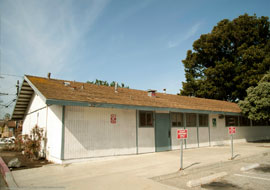
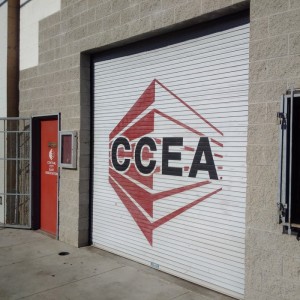

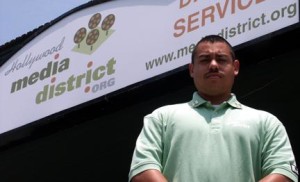
We’re also inaugurating a project to identify all the Media District security guards by name and image, parallel to the one we’re doing for the Andrews International BID Patrol. I’ve started a page for this project. There’s not much there now other than a list of all the current green shirts by name, but I hope to add more in the future.
Read on for a little bit of what passes for metadata analysis around here.
Continue reading More Media District BID Documents Now Available

Well, Judge Michael W. Fitzgerald of the U.S. District Court for the Central District of California (that’s federalese for “Los Angeles”) not only dismissed Inglewood’s case, he terminated it with extreme prejudice. You can read the order here if you wish, and it’s smoking hot. The salient bit for this blog is, according to Volokh, that:
The court held that, under California law (see, e.g., County of Santa Clara v. Superior Court (Cal. Ct. App. 2009)), cities can’t claim copyright in public records. And while the city claims that this provision is trumped by federal copyright law, the court rejected that argument — federal law treats local governments as political subdivisions of the state, and a state has the power to control what its subdivisions do (including which federal rights they claim).
Now, I can hear you all murmuring and wondering out there in internetlandia, saying “sure, Kohlhaas, we hear you, but what does this got to do with the BIDs??!” Well, friends, we’re glad you asked!
Continue reading Federal Judge Michael W. Fitzgerald of the U.S. District Court for the Central District of California Shows Up BIDs for the Mewling and Puking Liars they Are